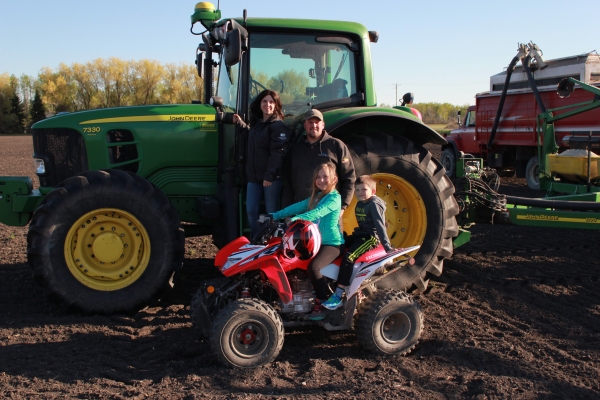“That wasn’t a smooth transition,” Brent Oswald says. “In my grandpa’s eyes my dad wasn’t supposed to get the farm.”
Soon after Edwood and Gwen bought the farm in 1968, their focus narrowed to dairy, but for several years everything was an uphill climb. “When they started farming they were so financially strapped they had to park vehicles because they couldn’t afford the insurance,” Oswald says. “They really had to struggle. I’m not going to say I didn’t have to work hard, but I didn’t have to climb that mountain.”
Edwood passed away in 2016. These days, Oswald and his wife, Kirsty, are farming 2,400 acres, milking 136 cows and discussing expanding their barn. This year, the pair was chosen as Manitoba’s Outstanding Young Farmers for 2017.
Oswald believes their succession to farm owners went perhaps as smoothly as such a major transition can. After his own experience, Edwood wasn’t taking any chances.
The ‘ultimate partner’
“My dad always said if his kids wanted to get the farm, he’d be the ‘ultimate partner’ helping with the transition,” Oswald says.
He signaled his interest in the farming operation early (his two brothers now work, respectively, at a General Motors dealership and as a veterinarian), and Edwood took note by giving him both responsibility and decision-making power very early on.
“Even by age 16 I was selling the hay and grain. I had full signing authority at age 18,” he says.
When Oswald and Kirsty got married in 2006, their accountant, Jerry Lupkowski, recommended that the family begin working on a succession plan.
“Mentally we knew how everything should play out; it was a matter of getting it all on paper,” Oswald says. “We spent probably two years doing it. It didn’t need to take that long, but the professionals see so many horror stories, they made sure that it was exactly how we wanted it to be.”
The first and most onerous part of the plan involved reviewing and appraising all farm assets, which Oswald undertook during the winter months.
“You don’t realize how much stuff you have to place a value on, right down to the lawnmower and the tools in the shop,” he says. “It’s a value that my parents built over the years that they should get something for.”
In 2008 the family did an estate freeze, once the value of all farm assets had been calculated. The shares were frozen and new common shares were issued to Brent. “Any growth from 2008 on was mine,” he explains. “So the idea is that over time I will buy the farm assets that are held in mom’s name personally, and that’s my way of buying the farm. We do that on years where it makes sense from a tax standpoint to mitigate losses and best utilize capital gains exemptions.”
The Oswalds structured the transition this way to ensure the farm could be flexible and not go into a holding pattern for a decade. In the meantime, the family updated their wills and shareholder agreements to reflect the changes.

 The Oswalds were chosen as Manitoba’s Outstanding Young Farmers for 2017. Left to right: Kirsty, Brent, Taylor (9) and Brenden (6).
The Oswalds were chosen as Manitoba’s Outstanding Young Farmers for 2017. Left to right: Kirsty, Brent, Taylor (9) and Brenden (6). 